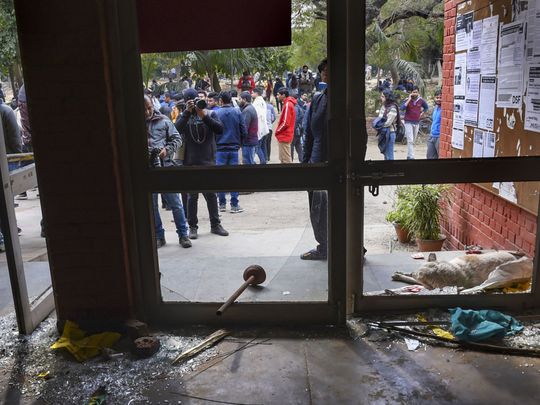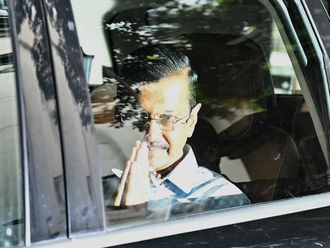
The January 5 attack by a mob of around 100 masked hooligans, who entered the Jawaharlal Nehru University (JNU) campus in New Delhi, and wreaked havoc targeting the premier institute’s teachers and students using brick-sized stones, iron rods and sticks, was not part of the campus’ political rivalries as initially propagated, but part of a pre-planned organised crime.
The goons entered hostels and faculty residences, attacked and terrorised students and teachers, and vandalised hostel property. The JNU administration as well as the security personnel deployed inside the campus, remained mute spectators in all this, doing nothing to stop the rampage. Police were lined up outside the campus main gate but were not let in until the goons had struck terror for a continuous two hours. When the lumpens victoriously marched out of the gate after their destructive activity, Delhi Police stood on either side and made a safe passage for them to get away and disappear into the roads and gullies of the neighbourhood. The evening of January 5, 2020, has indeed turned a new chapter on India’s contemporary history.
The country’s pliant ‘lapdog’ media has over the last three years incessantly referred to the students and teachers of this prestigious centre of learning as the ‘Tukde Tukde gang’ (the gang that will split India into pieces) and to the campus as a hub of anti-nationals, where debates and discussions on disintegrating the country are regularly held. However, the menacing camera images that went viral on social media of the January 5 attackers made even the soft-patrons of Prime Minister Narendra Modi’s New India question their erstwhile indoctrination of JNU-ites being anti-nationals. Was it the book-wielding JNU student or the masked, iron rod-wielding lumpen who was part of the “Tukde Tukde gang”? People also watched the lumpen elements masking their barbarism by shouting Bharat Mata Ki Jai. The two moot questions were: who had sent the goons, and, was the nation’s police force in reality protecting the miscreants, leaving the JNU community to their mercy.
The JNU [Jawaharlal Nehru University] community’s resoluteness in the face of repression often emboldens the civil society to rise up in activism against governmental injustices.
Over the past weeks, a largely indolent public throughout the country have woken up to the dubious games played by the powers that be. It should be said that by the time of the “terrorist” attack on JNU, people were sufficiently following the nationwide debates on the Citizenship Amendment Act (CAA) and National Register for Citizenship (NRC), both antithetical to the letter and spirit of the Indian Constitution, as well as the police brutality unleashed against students peacefully protesting the CAA-NRC in various university campuses. In the absence of any opposition party worth its salt left in India, ordinary citizens have been organising as civil society groups and pouring out by the thousands into the streets at various places to protest the Centre’s divisive measures.
The January 5 rampage stands out as violence has always been anathema within JNU, where disputes are won using persuasive intellectual reasoning and enemies won over with convincing logic. In this JNU stands as an island of sanity and rationality in the country, where elsewhere brute force decides the winner. After getting treatment at the All India Institute of Medical Sciences for the gashes received on her forehead, JNU Students Union president Aishe Ghosh, in true JNU tradition, stated: “Every iron rod used against the students will be given back by debate and discussion. JNU’s culture will not be eroded anytime soon. JNU will uphold its democratic culture.” It should also be noted here that the Delhi Police has promptly registered FIRs against the wounded Aishe Ghosh, and 19 others, on charges of vandalising the university’s server room the previous day whereas no action has been taken against the terrorists whose faces were clearly caught on camera.
more on the topic
No other institution in India provokes the ire of the Hindu nationalist Rashtriya Swayamsevak Sangh (RSS)-backed Bharatiya Janata Party-government at the Centre as JNU, the premier, public-funded predominantly social sciences and humanities university. In its very existence, JNU embodies India’s cherished values of democracy, secularism and gender equality. JNU’s good representation of students from underprivileged caste, linguistic and regional backgrounds of India, is made possible through a well-conceived system of deprivation points awarded to such students in the JNU entrance exam. In its mileu of ceaseless political discussions, students develop the faculty of organically responding to and critiquing the issues in their immediate society and in the larger world.
The current dispensation clearly recognises JNU as a prime obstacle that will create hurdles from time to time in the way of realising its Hindu supremacist project. Also, the JNU community’s resoluteness in the face of repression often emboldens the civil society to rise up in activism against governmental injustices, regardless of repercussions.
— Leena Mariam Koshy is a freelance journalist, and a former student of Jawaharlal Nehru University.







_resources1_16a45059ca3_small.jpg)

